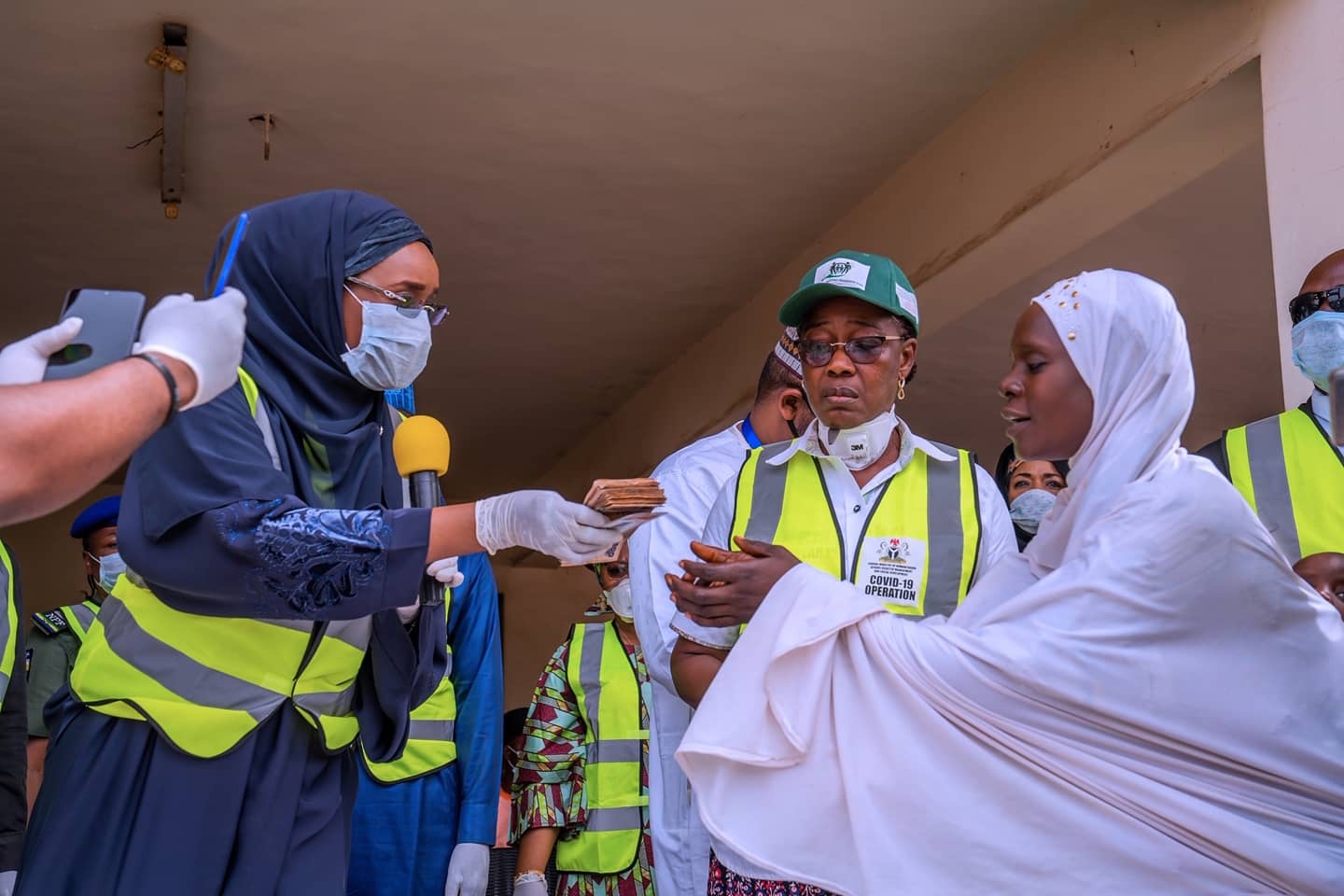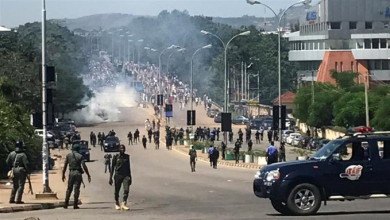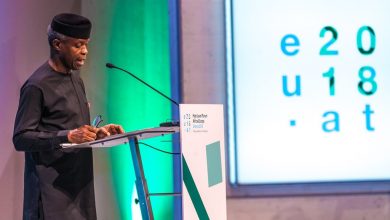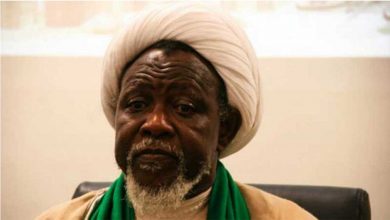
By Chief Yomi Adebiran
Last week, I watched, in surprise, as the Minister of Humanitarian Affairs, Disaster Management and Social Development, Hajiya Sadia Umar-Farouq traveled to the remote village of Kwali in FCT to disburse money to some locals. I was shocked, because, up until then, I was not aware that a financial free fall was being given out to ordinary citizens in Nigeria direct from Government.
As I, myself, began research as to why this stipend had not arrived at my door, I learnt that the money that the Honorable Minister was distributing was for a scheme that the Federal Government had introduced back in 2016 called that Conditional Cash Transfer Scheme.
Apparently, the program also known as the Household Uplifting Program, the Conditional Cash Transfer programme was introduced in 2016 and was operated and vested under the office of the Vice President, as part of President Buhari’s Social Investment Programme (SIP). At the time of its introduction, the Social Investment Programme was being run by Hajiya Maryam Uwais, who is the Senior Special Assistant to the President. At the time that the Social Investment Program was created, there was no Ministry of Humanitarian Affairs, Disaster Management and Social Development.
The Conditional Cash Transfer programme involves payment of N5,000 monthly, paid bi- monthly, to the poorest and most vulnerable Nigerians, mostly in rural communities. This includes Nigerians in every part of the country, from North, West, South and East.
Out of curiosity as to how the selection process of the program was made since it would be realistically impossible for every impoverished Nigerian to be included in the scheme, I found out that, at its inception, each community involved with the program was allowed to identify the poorest within them. After all, it is the members of the community who know best those amongst them that are not able to meet their needs. It is members of each community that know the most vulnerable amongst them. They know those who can go from house to house to borrow and beg for food and in the poorest communities, these sets of people are usually dependent on people as a means of survival.
Thus, this program was one that had been created and established long before the Ministry of Humanitarian Affairs, Disaster Management and Social Development came on the scene. The modalities and manner of disbursment of the funds was one that had been established long before The Ministry was created. So, when the Minister of Humanitarian Affairs, Disaster Management and Social Development took over the running of the program, she inherited a set way of executing the scheme. What I saw her doing in Kwali, FCT last week, was a model set before she came on to the scene.
Like many countries around the world, Nigeria has been grappling with containing the spread of COVID-19 since the index case of an Italian was first identified on February 27th 2020. Almost two months on, there are over 230 confirmed cases with 5 deaths and about 35 people have already been discharged. The rising number of cases understandably necessitated the two-week lockdown in some states within the country by the Federal Government to curtail the spread of the virus.
When the impact of COVID-19 began biting hard, together with the pronouncement of a lockdown in some states, the President directed the disbursement of advance payment of the Conditional Cash Transfer to the poorest households in the country. That was when the Honorable Minister of Humanitarian Affairs, Disaster Management and Social Development commenced payment as directed by the President. She did this by kicking off the exercise in Kwali local government Area in Abuja. Her presence most likely was to ensure probity.
I must say that it is highly commendable that towards alleviating the hardship of many less-privileged and poor Nigerians during the lockdown, President Buhari amongst other measures ordered this Conditional Cash Transfer (CCT) disbursement. And it is highly commendable that the Minister lent herself so personally to the assignment that she made herself present to supervise the disbursement in order to ensure that it went on transparently and without incident. In this hard and trying time, many of the recipients of this money would provide the much needed succor they desperately need. The Honorable Minister seemed in touch with this reality.
Optics and information has the power of playing mind games. It sure did with me because the vision of the Minister giving out money so close to the time that the Government announced stringent measures to curb the Covid disaster, initially resonated with me as monetary relief directly linked to Covid funds. This, apparently, is not the case. The Conditional Cash Transfer (CCT) disbursement made by the Minister of Humanitarian Affairs, Disaster Management and Social Development, Sadia Umar-Farouq was just the advance disbursement of an already existing scheme.
Noteworthy, however, is Arnold’s sayings that a good leader leads the people from above, while a great leader leads the people from within. By going to Kwali to supervise the disbursements of funds in person, the Honorable Minster undoubtedly lead from within. However, this has led to criticisms and an opportunity for fake news peddlers to showcase their malignant craft.
Firstly, there was “fake news” making rounds particularly on social media that the disbursement was meant for Northerners only. On Social Media in particular, there were numerous posts claiming that the Minister of Humanitarian Affairs, Hajiya Sadiya Farouk, said that only the poorest Nigerians resident in the North are qualified to receive Federal Government’s Conditional Cash Transfer during the coronavirus pandemic. These posts were made with the photograph of the Minister and captioned: “We are only sharing money to the poorest Nigerians in the North because we don’t have poor people in Southern Nigeria…” This is outright spiteful and concocted to whip-up ethno-religious sentiments within Nigerians.
While the Minister has since debunked this claim, stating that the Federal Government’s cash transfers are for the poorest households in the whole country, its distribution is not decided by region and that there is a social register for all states which will be used to guide the process. This can be verified considering the fact that the disbursement has already began and is ongoing in Anambra, Oyo, Rivers, Kogi, Bauchi, Imo, Abia. Notwithstanding that, it is apparent that there are those bent on usurping efforts the government is taking towards ameliorating challenges many Nigerians in the low income bracket face, particularly in these challenging times of the coronavirus pandemic, where since the beginning of the year, the country has been recording dwindling revenues due to the fall in oil prices.
Additionally, in the news lately, there have been reports of mindboggling figures of financial contributions of organizations and individuals to the fight against COVID-19 in Nigeria. Many naysayers have latched-on to this, egging the public that the conditional cash transfer being disbursed by the Humanitarian Minister is gotten from these monies. This of course is false as the monies being disbursed have already been budgeted for.
The Ministry of Humanitarian Affairs, Disaster Management and Social Development, by default, is responsible for the disbursement of many of the palliative measures by the government during this time of emergence caused by the Covid-19 pandemic. The Minister has since maintained that the disbursement was one of the measures authorized by President Buhari to help citizens cope with the fallout of coronavirus. Other measures include the recent pronouncement by the President to begin distribution of seized crops and food items by the Nigerian Customs to Nigerians.
Another major criticism is that the Minister was disbursing out cash and not through banks or electronic means. Well the name of the programme is Conditional “Cash” Transfer. Moreover, many of the intended recipients are the poorest of the poor and mainly dwell in rural areas. Now, how many banks are situated in rural areas and how many of the intended recipients possess bank accounts? We all know that the answers to these questions is that quite a handful do not have bank accounts and many banks are absent across rural areas in the country.
Nonetheless, from the Ministry’s information link, there is news that the Minister is exploring other means of disbursing the monies to intended beneficiaries that includes electronic means amongst others. While this archaic means of disbursement was one that the Ministry inherited, the Ministry is exploring a more modern means of disbursement.
During this challenging period of the COVID-19 pandemic, it is time to band together as a people in unison, regardless of political affiliation, creed or ethnicity, towards ensuring that we halt the spread of the disease in our country. It is also not the time for naysaying, but support efforts being made by the government to alleviate the sufferings of the less privileged in our society and measures taken to curtail the spread of COVID-19. The challenge we currently face is quite huge and the lockdown in some states is becoming unbearable.
Now, instead of judging the Minister of Humanitarian Affairs, Disaster Management and Social Development, Hajiya Sadiya Umar Farouq by watching her carry out the Conditional Cash Transfer in Kwali, Abuja, I say “Kudos” to her for playing her part in the way that it is expected of her.
Every cloud has a silver lining and as a people we shall overcome this challenge. Let us also play our part in overcoming it.






